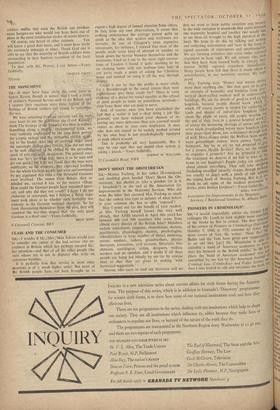SIR,—It must have been about the same - 011ie. as Simon
Raven, though in winter, thin I took a trtitip of ordinary National Service men to see Belsen, and I suspect their reactions were more typical of the feelings of British soldiers tob young to remember
the war.
Ao.ir We were returning frottt-oui exercise and my. ineno,-,,. were keen to sec the site (Lord Russell's:" book The Scourge of trigliiotilso sti:is then in vogue).. Stumbling along a, til,01,4, unsignpostcd track, we'.' were suddenly conficpled- by the lung mass grass*? the cryptic noticV,s'ImtliticTrrietinorial ing to the leaden skictlikti. an :accusing runj er. amid the seemingly_tdie.Ahine:frieciitS.,,y0 did not need to be well eilOtitp ACtie chilled* the pervading spirit of eviltiVd.fu(0'. desolation, The general reac- tion was let'S'sce. Whitt there is to be seen and get out quick;, but I do not .I'eettll that the men were indifferent; on the contrary,. they expressed loathing for the whole German people and were not7convinced by my argument that Mil)/ a fe.w thousand Germans were involved. The stencn from .13elsen, they re- minded me, carried 8 km. to the nearest village. How could the German people have remained ignor- ant, and why did they not revolt?. I•hope I dO,npt elaborate in retrospect, but I believe a fierce 'argu- ment took place as to whether such lbestiality was endemic in the German national character. 'So far from dissociating themselves from the past, they still accepted 'the war-time dogma that 'the only good German is a dead one.'—Yours faithfully, BRIAN nom)
6 Cromwell Crescent, SWS






































 Previous page
Previous page